‘It was the last time we saw him’: an oral history of the Humboldt tragedy
From puck-drop at the team’s last epic game to the laying of bouquets at centre ice, the story of a bus crash that left a nation reeling
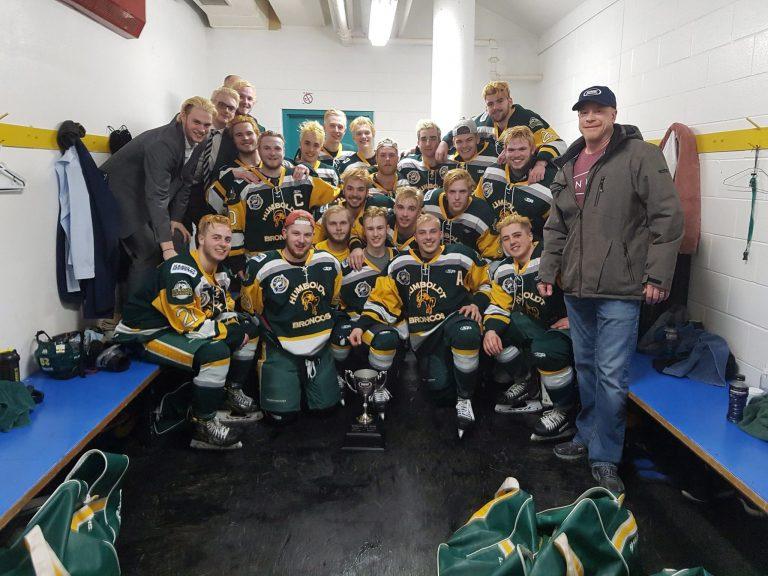
Members of the Humboldt Broncos junior hockey team are shown in a photo posted to the team Twitter feed, @HumboldtBroncos on March 24, 2018 THE CANADIAN PRESS / Twitter-@HumboldtBroncos
Share
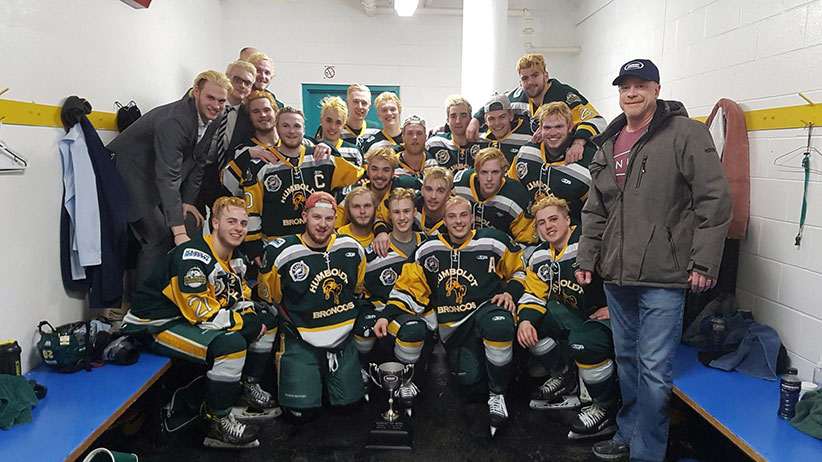
As told to Aaron Hutchins, Jason Markusoff, Kyle Edwards, Meagan Campbell and Michael Friscolanti
Three weeks ago, the Humboldt Broncos squeezed together for a celebratory team photo—a snapshot now synonymous with unthinkable heartache. Their hair dyed bright yellow for what they hoped would be a long postseason run, the players had just pulled off an upset, beating the Melfort Mustangs four games to one in the opening round of the Saskatchewan Junior Hockey League playoffs. The Broncos’ reward was a date with the first-place Nipawin Hawks, their longtime rival. After squeezing out a victory in Game 3 of that best-of-seven series, the Broncos were down 2-1 when they laced up their skates for Game 4 on home ice: the famed Elgar Petersen Arena (EPA), named in honour of Humboldt’s most tireless volunteer. Win again that Wednesday night, and the series would be tied; lose, and the Hawks would grab a commanding 3-1 lead. Either way, the Broncos would be boarding a bus back to Nipawin for Game 5 on Friday April 6.
CHAPTER 1: GAME 4
Kathleen Keen, Broncos’ billet co-ordinator: It was intense. It was an edge-of-your-seat kind of game. Those boys played so hard—so hard. It’s tough to think about it now, almost surreal.
Rob Muench, Humboldt mayor: It was one of the best hockey games I’ve seen in a long time.
Carter Doerksen, captain of the Nipawin Hawks: That rink was packed. It was so full.
Russell Herold, father of Broncos defenceman Adam Herold: It was a good atmosphere. Humboldt’s got a nice rink and the seats are bowl-style with fans all around.
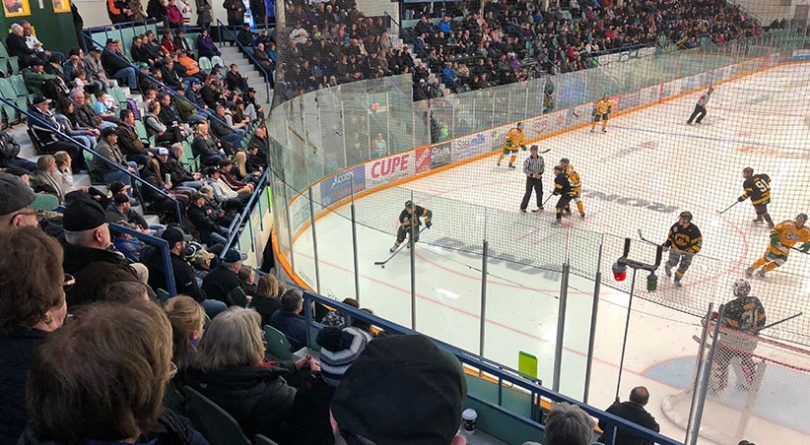
Keith Salamon, one of the referees: Lots of jerseys, cowbells and noise makers. The atmosphere was great even on the Nipawin side—they had a good full section of fans that they brought as well. It was noisy for both teams.
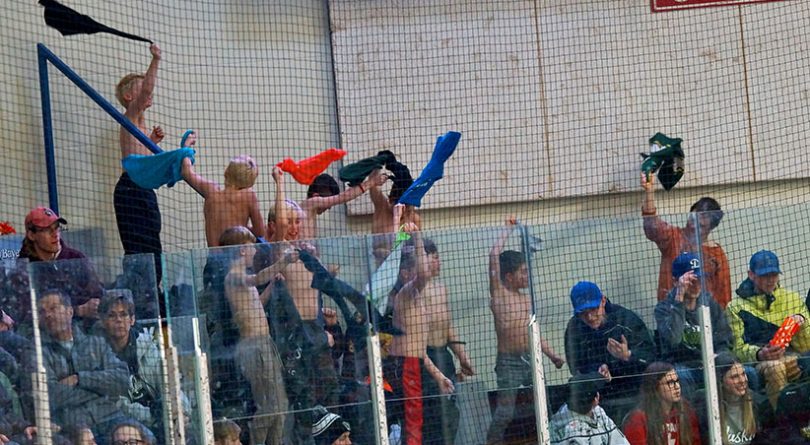
Brandan Arnold, right wing, Nipawin Hawks: It’s a tough rink to play in every time we’re there. We knew we needed to step up in Game 4.
Salamon: It was a very important game because it either could have went 2-2 in the series or 3-1. You could sense the tension, the rivalry, the intensity of the game.
Al Gaetz, former Broncos general manager and longtime season-ticket holder: All the boys dyed their hair yellow. If they got by Nipawin they would have dyed it green. That’s the tradition.
Doug Johnson, Nipawin head coach: It was a roller coaster of a game. It might have been the most exciting game for a spectator that I’ve ever been a part of. For a coach, it was hell.
Harold Thiessing, longtime Broncos fan: I went to all the games here, playoff games, and when you see the kids score goals, you never think that’s the last time you’re going to see them.
Doerksen: My first shift of the game, we got scored on. [Logan] Schatz scored; he made a nice play and burned us on a two-on-one. We dug ourselves in a hole pretty early.
Johnson: We were down early. Then one of our top forwards scored two goals in one shift. Then we got a big one after a penalty kill and we were up 3-1.
Arnold: It was a weird game. We were up 3-1, and then they scored four quick goals. Going into the third period it was 5-3.
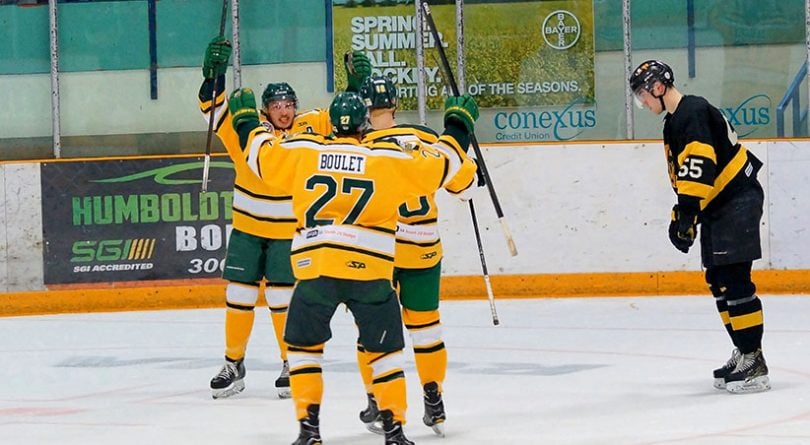
Clark Stork, former Broncos radio play-by-play announcer: We had a 5-3 lead going into period three, and you’re thinking: ‘Holy man, we’re going to tie this series against the Nipawin Hawks, the best team in the league. We’re in this thing.’
Rene Cannon, a ‘billet mom’ to Broncos Xavier Labelle, Logan Hunter and Adam Herold: The boys had really worked to get that two-goal cushion and then when that fourth goal was scored [by the Hawks], the EPA just got a bit quieter.
Herold: It’s looking really good, but Nipawin ties the game and we go into overtime. Then another overtime. These are full periods, so this is dragging out.
Salamon: Both teams were obviously getting tired, but for almost six periods of hockey it was a really good game—the atmosphere was still there. I think all the fans stayed, everybody was still in their seats. The players were still playing hard, finishing their hits, playing well for technically playing two hockey games almost.
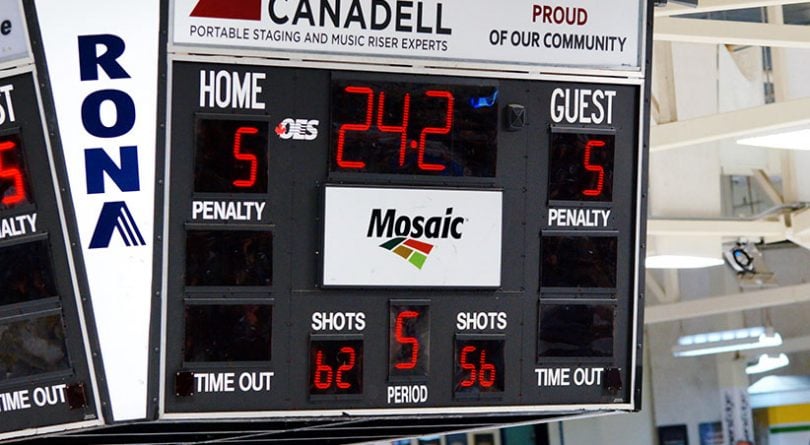
Johnson: There were ebbs and flows. There were times we were taking it to them. Other times, they were taking it to us. I remember our goalie made a phenomenal save on Conner Lukan.
Doerksen: Both goalies stood on their heads. In a 6-5 game, you don’t usually say the goalies stood on their head, but they played amazing. I recall one post that Schatz hit. I watched it from the bench and your heart sinks, but it didn’t go in.
Aaron Lukan, season ticket holder and president of Humboldt Sports Hall of Fame: There were so many chances on both ends. I thought we out-chanced them but just could not get that winner.
Muench: I’m a photographer, so I spend a lot of time taking pictures. I was taking pictures of the crowd and the game. I just thought I needed to get up and take pictures. In hindsight, that was probably a good thing. I just felt the urge to do that.
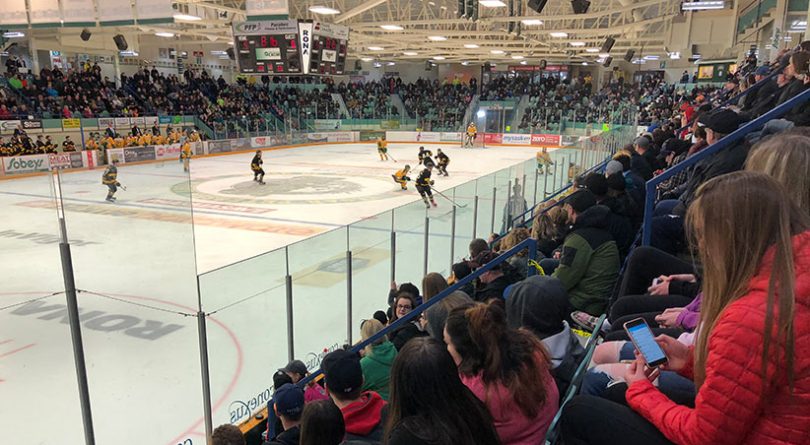
Tarrington Wyonzek, one of the referees: I called a penalty shot in triple overtime. It’s probably the biggest penalty call I had in my career. It was a 100 per cent clear breakaway for the Nipawin forward [Brandan Arnold] and the Humboldt defenceman dove at the player in hopes of hitting the puck away and he ended up taking his legs right out. You heard a little bit from the crowd, but it was such an easy penalty to call that no one argued it. I remember holding my arm up, blew the whistle and I immediately pointed to centre ice. I remember hesitating for a split second thinking to myself: ‘Holy shit. Are you going to call a penalty shot in triple overtime?’ Yeah, I did.
Salamon: I don’t think there’s a person in the rink that didn’t think it was going to be a penalty shot. It was about as easy as a penalty shot you could call.
Doerksen: A penalty shot for Brandan is a goal almost every time. But the ice was wet because it was right at the start of the period. He went down and I don’t know if the puck bounced, but he didn’t get a shot. Basically, it looked like he fanned on it or put it in [the goalie’s] pads.
Wyonzek: After the penalty shot, the fans went nuts. The rink was loud. Then Humboldt ended up taking another penalty shortly after that. I called that penalty as well.
Doerksen: [Grant] Baetsen got a borderline hit from behind from [Nick] Shumlanski, an awkward hit along the boards. It could have gone uncalled, but there’d be some unhappy people.
Johnson: It wasn’t a penalty anyone could argue about. He hit him from behind near our boards.
Wyonzek: The Nipawin player was a good two to three feet away from the wall—the danger zone, as we call it. The Humboldt player, I don’t think had intentions to hit the Nipawin player from behind, but the stick was right on his back and he gave him a real good shove. The Nipawin player didn’t have great balance and went shoulder first into the wall. I had to call a cross-check. It couldn’t be overlooked.
Doerksen: On the power play, we were working the puck around. Brandan [Arnold] had the puck on the left side and shot it. It hit the goalie on the shoulder, bounced up, and trickled in behind him. It was a lucky bounce.
Arnold: I shot it on net and couldn’t see it. My two linemates were at the net and they had their hands up. You’re excited, but you’re just so tired.
Doerksen: We all jumped the bench. Winning in overtime is the best feeling, let alone winning in triple-overtime.
Wyonzek: Nipawin had a good section of fans who were very happy. The professionalism of Humboldt, they put their heads down and skated off the ice.
Lukan: It was after midnight. People had to work in the morning. Everyone couldn’t wait for it to end, but when it did end, it was a tough to see.
Muench, the Humboldt mayor: The disappointing part is we outplayed them that game, especially in overtime. We deserved to win. The Broncos didn’t do anything to lose that game. It just went the other way.
Cannon: People were deflated and obviously exhausted. I haven’t attended too many hockey games until midnight, but no one had given up hope.
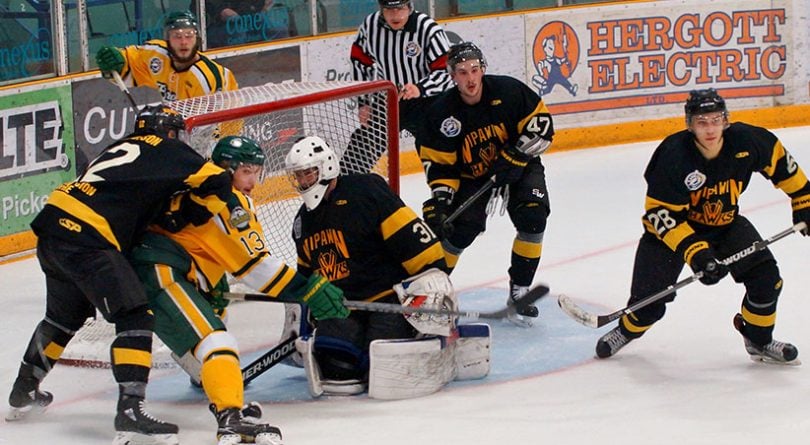
Stork: It was devastating when we lost Game 4. You know, we had a 5-3 lead, blow it in the third, and Nipawin eventually wins in triple overtime. We’re like: ‘Oh man, this is the worst. We’re down 3-1, we’re going back there for Game 5, our season’s over.’ Little did we know what was going to happen. Now the result of those games is absolutely minuscule. Now I wish the guys would have lost our first darned series to Melfort because they wouldn’t have been on that bus to Nipawin and they’d all be alive.
Herold: We wondered if we would stay after the game to talk to Adam. It’s a three-hour drive home [to Montmarte, Sask.], but we did stay. Thank God. That was the last time we saw him.
CHAPTER 2: BRONCO PRIDE
Brayden Klimosko, former Broncos player and assistant coach: I was born and raised in Humboldt. It’s just a typical small town in Saskatchewan. Everyone knows each other, everyone is friendly towards each other. It’s amazing. I love everything about it.
Austin Duzan, former Broncos player: When you think of Humboldt, the first thing you think of is the Humboldt Broncos. The first thing you see when you drive into Humboldt, from the highway, is the rink.
Rob Muench, Humboldt mayor: The Humboldt team used to be called the Humboldt Indians, for years, since the 1940s. In the 1970s, it was reorganized and restarted from scratch. They had no money, no resources. It was all local volunteers, even the coach. Somebody in the organization knew someone in Swift Current, and knew the Swift Current Broncos got new sweaters and they had old ones they weren’t using anymore. They gave Humboldt the sweaters, so we got these green sweaters that said Broncos on them. That’s how we became the Humboldt Broncos.
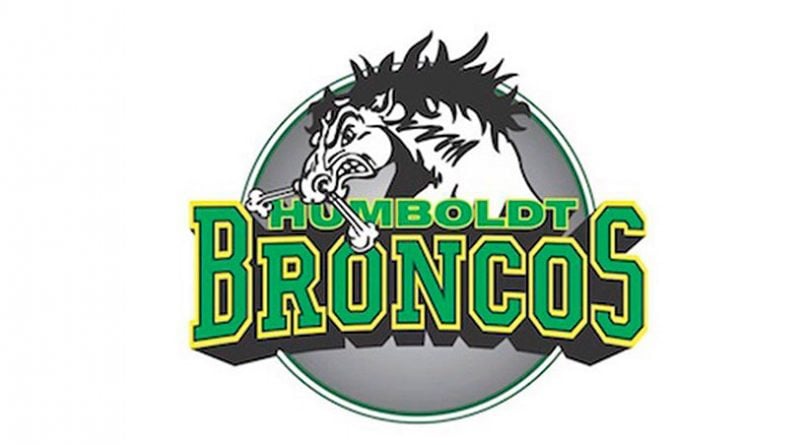
Aaron Lukan, Humboldt Sports Hall of Fame president: I was a season ticket holder their first year. I was a young kid, and the Broncos were the be all and end all for the community. I remember being in [the old] rink and there was a catwalk that went from the back of the arena to the goal judge box, and there were fans up there. In today’s world, the fire commissioner would never allow that, but that’s how many people were in the building. There were no seats in that rink, just benches, so people stood the whole game. There was a Saskatoon writer of the day who coined the phrase: ‘The Humboldt Broncos: the team that gets a 60-minute standing ovation.’
Tom Kiefer, season ticket holder and former billet parent: Hockey in rural Saskatchewan is so big. It’s become a social thing. You come to the games, you know the team, you get to know the players. It’s part of living in Humboldt.
Klimosko: Our whole family had season tickets, and all four of us would go to games: my mom, my dad, my younger sister and me. It is what we did, especially on the weekends: go the rink and watch the Broncos.
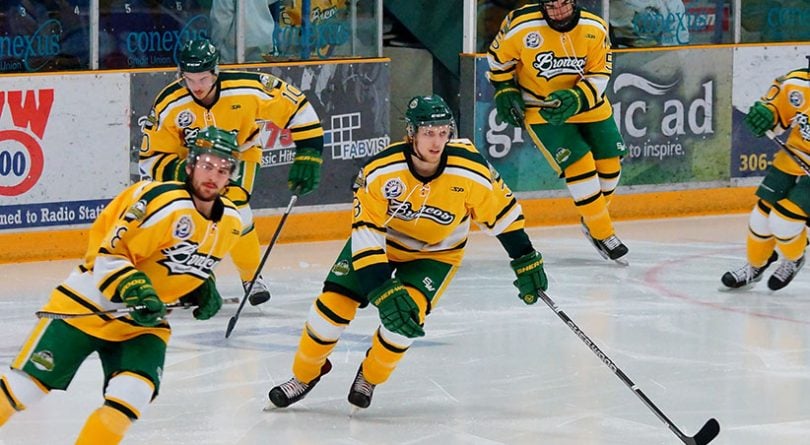
Lukan: Elgar Peterson was always at the rink, a super volunteer. Parents used to drop their kids off at the rink for skating and Elgar was there and he’d tie their skates. After the Broncos’ first season, he became a fixture on the Broncos and he put at least 40 years of volunteering in. When you meet an ex-Humboldt Bronco, the first question that’s asked is: ‘How’s Elgar?’—every time. He had a remarkable effect on the players, and was known throughout the community and the SJHL. Obviously, naming the [new] arena after him tells you about his importance.
Bill Chow, president of the Saskatchewan Junior Hockey League: The 12 teams we have in Saskatchewan are community-owned. They’re all run by volunteers. There’s nobody getting any money…You go to the rink because it’s part of the community. You go to the rink to meet people, to talk to people, to socialize. That’s what hockey means to Saskatchewan.
Al Gaetz, former Broncos general manager: In 1995, the team had a deficit around $200,000 and folding the club was considered. I joined the board and became office manager, and initiated the first Humboldt Bronco Combine Lotto. Four dealers gave us special prices for combines, you know, ones for harvesting. In three months we made $250,000, and we couldn’t stop them coming. The farmers were going mad. We oversold by $100,000, and we were required by government to give that back. It’s been held ever since—now it’s a cash lotto.
Lukan: Humboldt has 10 provincial championships and two national championships. We won the RBC Cup (the National Junior A Hockey Championship) in 2003 and 2008. I don’t think anyone else in the league has 10 titles. But it’s been a struggle the last number of years. We haven’t been as successful as people in Humboldt are used to.
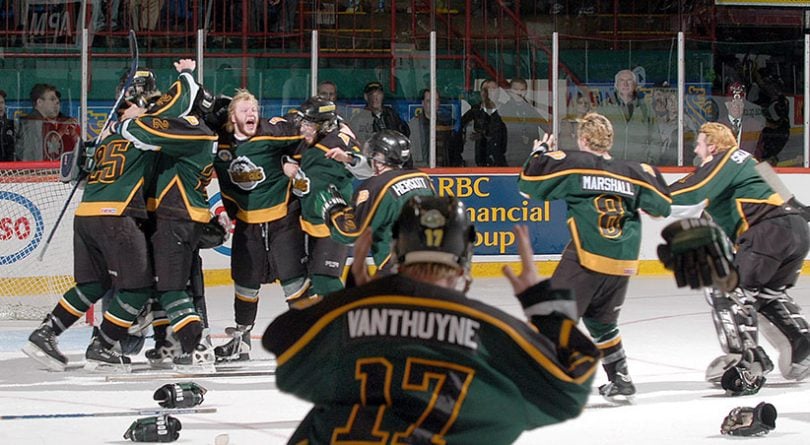
Klimosko: When Darcy Haugan took over [as head coach and general manager], he came into a tough situation. He came in late-August 2015 and we were kind of in limbo. We didn’t have a great start. I think we had a streak where we lost 26 straight road games or something. It was so tough at times. You could just see the disappointment on the fans’ faces.
Kevin Garinger, Broncos president and billet dad to Conner Lukan: The Humboldt Broncos were not about building hockey players, but creating amazing young men. That’s what we had in our organization—amazing young men. That was Darcy’s belief: that through that process, they would ultimately become great hockey players, too.
Klimosko: Our locker room needed some work, and the first thing Darcy wanted to do was make sure he fixed it up nice. He wanted to make sure it got a new coat of paint and new decals on the wall. One thing he would always say is: ‘This is such a storied franchise, and we’re not proud enough of it. I want everyone who plays for my hockey team to know that we’ve won these championships.’ It was kind of a breath of fresh air. We were so good for so many years and we were kind of struggling, but he was so proud to be there. To be honest, not only myself, but the whole town at times, lost that pride.
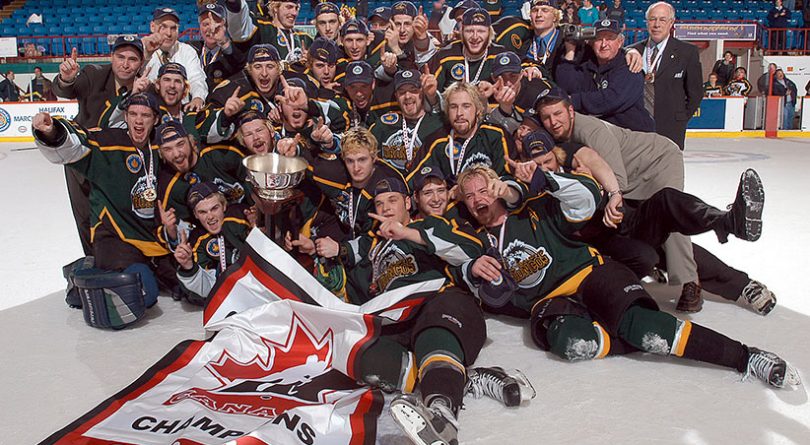
CHAPTER 3: ‘CINDERELLA TEAM’
Kevin Garinger, Broncos’ president and billet dad of Conner Lukan: It’s hard to put into words what [being a billet parent] is like. You love them, and you care about them deeply, and you want the best for them…It’s a hard responsibility for anyone because you fall in love with these guys and you know there’s a time when they’re not going to be in your home anymore.
Rene Cannon, billet mom of Labelle, Hunter and Herold: Some of the boys that we have had move into our home, who have never been away from home, feel like guests. It takes them longer to feel they can go into the pantry and eat whatever they want and that sort of thing. I said: ‘If it’s in the pantry, it’s free game.’
Colin Brochu, billet dad of captain Logan Schatz: The first night he was here, he walked in and he was checking the fridge to see what we had for leftovers. It made it really easy not to have the awkward moments. He was comfortable here, which made us comfortable with him here.
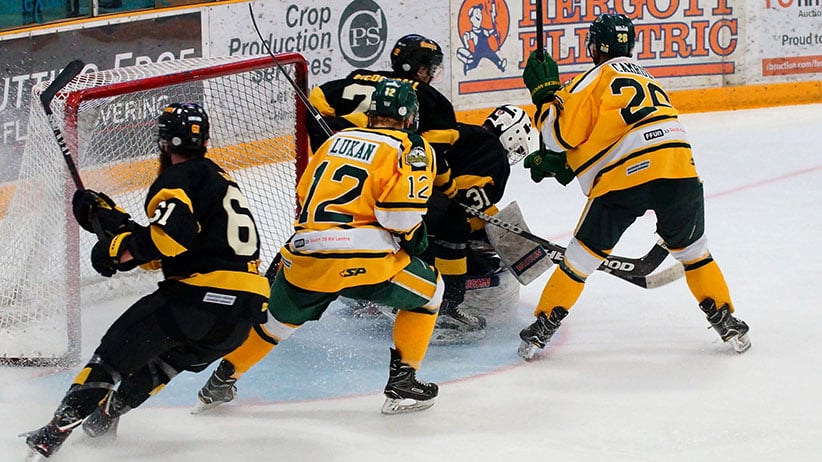
Justin Rempel, Melfort Mustangs trainer: Jaxon Joseph was one of ours before we traded him to the Broncos. He was just a really genuine, caring person who would definitely give the shirt off his back if he needed to and if he could. Great sense of humour; the guy was always making jokes. He loved to chirp at everybody that was on the ice—make fun of them and tell them how bad of a hockey player they were, just trying to get them off their game.
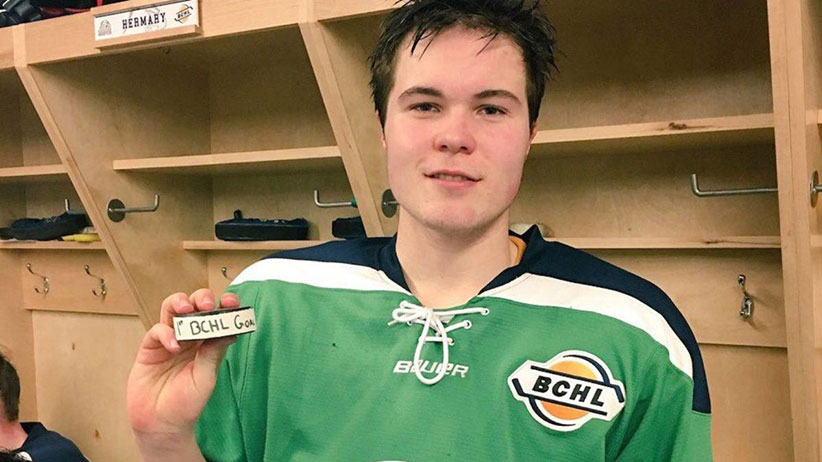
Cannon: Xavier liked to tell outrageous stories. I often joked you can only believe a third of what comes out of his mouth, so you really need to think about whether what he is saying is the truth…He was filled with mischief. If we were having a conversation at supper that made my girls squirm or gross out, Xavier would step right over the line just a tiny bit more.
MORE: A billet mom’s photos offer a look at the home life of three Humboldt Broncos players
Garinger: Conner was a quiet guy, he joked around a little bit but in the dressing room Conner was very much a leader. We had many leaders on the team but Conner was a leader. He was one to be vocal in a dressing room environment. We always talked about the fact we had multiple captains on our team. Conner Lukan could have been a captain.
Curtis Thiel, Broncos’ assistant equipment manager: Dayna Brons was like a little sister to me. She was very dedicated to her training. She did everything. Besides being the team trainer, me and her did laundry. We sharpened skates. When new players come in, we fitted them with pants and a helmet. Basically the behind-the-scenes stuff.
Jack Redlick, head coach of the St. Albert Raiders: I coached Logan Hunter last year. Logan’s a big kid, but he’s really a giant teddy bear. He’s one of those people where you’re hard-pressed to walk into a room and not find a smile on his face. He’s always happy, he’s laughing and he’s smiling, and that becomes infectious.
Cannon: Logan and Xavier bought my daughters chocolates on Valentine’s Day this year and they walked up the stairs with a dozen roses and chocolates for me. Then they invited the girls on Valentine’s Day evening to finally play Settlers of Kattan downstairs. I joked with my husband that our girls were their Valentine’s Day dates, and they wrote on the chocolates that they gave my girls to whichever daughter, Abbie or Tessa, and it said: ‘From Bros.’
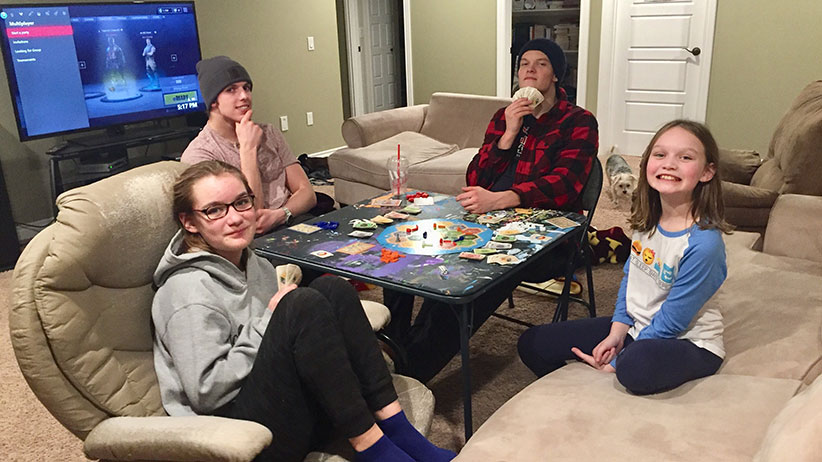
Marilyn Hay, mother of play-by-play announcer Tyler Bieber: Tyler would get up at 5:30 every morning and go to work, but his day didn’t stop there. After, he would volunteer with the high school kids—teaching them basketball, football, he taught the girls flag football. He had a real passion for that.
Scott Thomas, father of winger Evan Thomas: Evan hated having his picture taken, and most of the pictures we have of him just by himself—even his grad picture—there is no smile there. But every picture with his teammates, he has a smile on his face. He loved being part of a team.
Garinger: [Brody Hinz] could tell you statistics. Pick a couple of teams in NFL football, and a year they played against each other, and he could tell you everything about it. He was an amazing mind. He was passionate about the Humboldt Broncos. He had a major role; the coach had him doing not just stats but other things, and Brody just loved it. Players loved it too.
Neil Langevin, godfather of defenceman Logan Boulet: Logan had made it known, and very clear to his family, that he had signed his organ donor card when he turned 21 just a few weeks ago.
Chris Musselman, friend and colleague of bus driver Glen Doerksen: He didn’t look at it as a job. When you’re the bus driver, you’re looked at as part of the team. He loved sharing stories with hockey parents. He would get into games for free. He loved watching hockey. Glen cheered for those teams as if his own kids were playing.
Antonio Di Paolo, former Broncos player traded in October: Everybody was so gelled together as a team. Everybody was so close. There were never any issues. We were just a group of guys happy to see each other every day. There were jokes every day. Being at the rink was everybody’s favourite place to be.
Thomas: Darcy loved this group of players. He thought this group of players had something special. They had this aura about them that Darcy really loved.
Aaron Lukan, Humboldt Sports Hall of Fame president: Darcy made a couple of trades, just huge moves. They got us more scoring. We were a one-line team and him acquiring Shumlanski allowed a guy to move to the second line, and then that line started clicking. Then getting Fiske on defence was a huge move. I think we were middle of the pack early in the year. Only maybe one or two teams had a better record than the Broncos in the second half of the season. They really turned it around.
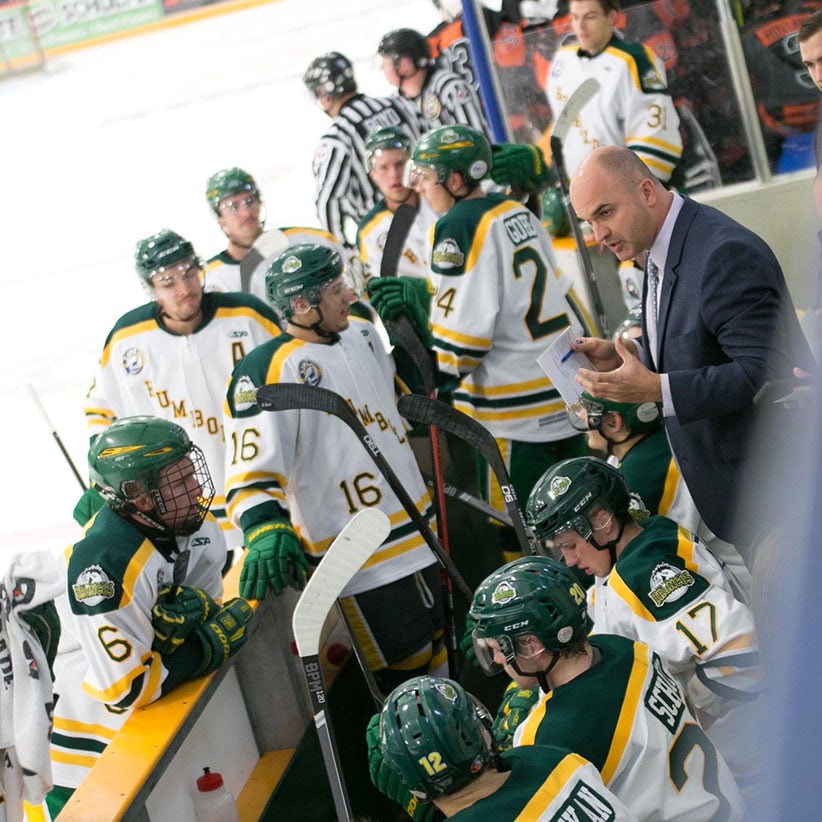
Thiel, equipment manager: That Friday at 10 o’clock there was a very light practice. On game days, they usually just have a light practice, an hour, maybe an hour-and-a-half, because they don’t want anyone to get hurt. We were hopeful that day. The guys had a positive attitude. I’m not sure which player—Brayden Camrud or Logan Schatz—they said: ‘This is a Cinderella team. We’re not giving up.’
Brayden Klimosko, former Broncos player and assistant coach: I talked to Brayden Camrud, and the one thing I asked him was: ‘What were your thoughts going into Game 5?’ He said: ‘There was no doubt we were going to win that hockey game.’ I am sure you’re not familiar with Nipawin’s rink. They call it ‘The Cage.’ It’s a tiny rink, it’s tough to play in, and it’s tough for away teams to win hockey games. It is very intimidating for a road team, so for him to say there is no doubt we’re going to win, they were feeling good.
Di Paolo: There’s a restaurant in Humboldt called Johnny’s Bistro that makes the best food on the planet Earth, and that’s not an exaggeration—it’s incredible. One of the owners/operators, she billeted three of the Broncos. She would give us 50 per cent off on game days. We’d go for morning skate, be there at 9 a.m., be on the ice at 10 a.m. for about 25-30 minutes. Then we would head over to the Johnny’s, we’d all sit together and eat and talk and stuff.
Stephanie, a server at Johnny’s Bistro, who asked that her last name not be published: They were here Friday morning. They all looked alike because they all had blond hair. They would all be joking around on their cell phones and talking about their girlfriends.
Cannon: I think they were very determined. I know that one of the comments, or one of the sayings, that I saw on a few of their Instagram posts—and that I know came from Darcy Haugan—was: ‘Why not us?’ That was their attitude. Even though they weren’t top ranked, ‘Why not us?’ We’re strong. We can do this. We can work together.
Chris Beaudry, assistant coach: I never once thought we weren’t going to win the [Nipawin] series, even though we were down. Because I’m a confident person and we have a confident group.
Klimosko: This was a special team. There was some destiny there. You knew they could go far. I really felt that they were going to go to Game 7.
Beaudry: I don’t travel with the team on games that are east of Humboldt, because I live an hour east, so it doesn’t make sense for me to drive back to town and jump on a bus that drives basically past my house to get there. The roads were fine. I was 40 minutes behind the bus.
Ryan Straschnitzki, Broncos’ defenceman: We were down 3-1 in the series and we had one practice that morning and we knew what we needed to do. Everyone was getting amped up in their own way.
Nick Shumlanski, Broncos centre: We were just joking around [on the bus to Nipawin], a couple of the guys, and then all of a sudden we just, like, slammed on the brakes and that’s pretty much the last thing I remember, is just seeing a couple guys stand up to see what was going on and I’m not sure what happened after that.
Straschnitzki: All of a sudden the bus driver screamed ‘whoa’ and a semi-truck pulled up in front of us. After that, I just blacked out.’
CHAPTER 4: ‘A DEVASTATING SIGHT’
Straschnitzki: A couple minutes later I woke up. I ended up outside the bus staring directly at the bus, and I saw a couple teammates lying in front of me.
Matthieu Gomercic, Broncos left winger, who was trying to sleep in the back of the bus when he heard the brakes squeal: The next thing I knew, I was picking myself up off the ground and kind of looking around.
Shumlanski: Somebody woke me up, I think, and then I just managed to grab a phone from somebody, just called home to let [my dad] know that they needed to get there as soon as possible.
Straschnitzki: I kept calling out guys’ names and asking if there was anything I could do. All I wanted to do was just help my teammates, but I just couldn’t move my legs. I had a couple teammates lying in front of me. I was in shock and didn’t know what to think.
Myles Shumlanski, Nick’s father: As soon as I came, I knew that it was a disaster. It was a pretty devastating sight…People were getting blankets. You were taking your jackets. You were doing anything to cover these boys. They were in snow and ice and it was very cold.. They were in very bad shape.
Straschnitzki: Nick Shumlanski had blood on his face and he was moaning in pain. Logan Boulet was next to him. Then I saw Bryce Fiske—his head was up and he had blood on his face but I wasn’t sure what was going on. I later found out in the hospital what had happened to him (Fiske survived).
Gomercic: Finally, I kind of came to and started crying.
Straschnitzki: We had people who had pulled over their cars who didn’t want to lift me because they didn’t know what was wrong—I said I couldn’t feel my legs so they didn’t move my neck and they waited for the ambulance.
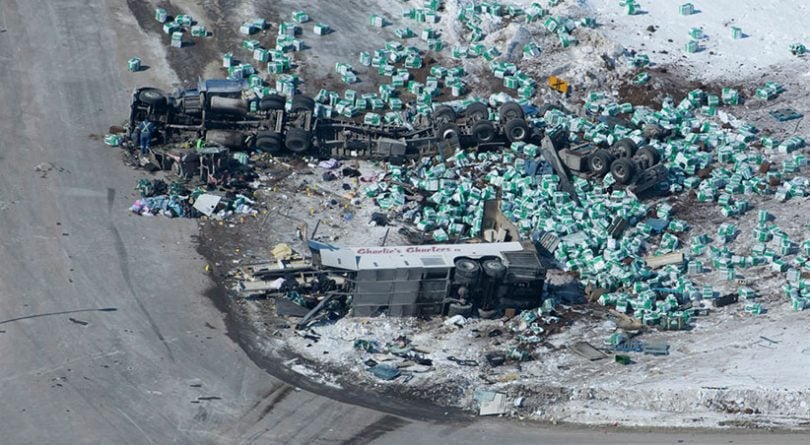
Jessica Brost, owner of Northeast EMS in Nipawin: I’ve been in EMS for 13 years and an advanced care paramedic for nine years. I took over the company as owner-operator on April 1st. The staff received it well. It was a secret up until two days prior. Lyle [Moffatt] had a meeting and said he’s retiring. In the next breath, he says we’re taking over.
Lyle Moffatt, former owner of Northeast EMS: I’ve been a paramedic for 32 years. I was doing a fundraiser on April 6th for our community and there were two EMS people at the fundraiser and a couple firemen. One of the firemen’s alarms went off on his pager. He said: ‘I have a crash I have to go to.’ After 32 years, I figured I needed to go to, but it wasn’t my place so I stepped down.
Brost: It was a nice day, kinda quiet. It was an office day, clearing up things with the ministry of health. It was a few minutes before 5pm, I had the vehicle with the car seats and I was going to go pick up my kids when dispatch called: ‘Semi versus bus. Thirty-five patients.’ A lot of my staff heard three to five patients. The information came through again and they heard 35. Even dispatch was in shock. I said: “Call everyone on my list.’
Carter Doerksen, captain of the Nipawin Hawks: I’m one of the first ones at the rink, around 5 p.m. Then we heard a bunch of sirens. Guys coming to the rink said they were passed by four or five cops, ambulances, fire trucks. We knew something wasn’t right, but you’re still trying to focus on a hockey game. Humboldt will be here any minute.
Brost: Being naive, we were talking about who this might be. When you think bus, you flash immediately to children. And then we realized school was out this week and it’s 5 p.m. Then we thought: ‘Oh, hockey game.’ Then we thought maybe it was the fan bus. Then we realized—this could be the team.
Moffatt: Within 20 minutes, through social media, we found out it was the Humboldt Broncos bus and there was 30-some patients. I immediately phoned Jessica and she didn’t get back to me. She almost always gets back to me. I knew her hands were full so I went down to the ambulance station. There’s usually six vehicles parked there and they were all gone, except for my old supervisor truck. So I jumped in the truck and off I went.
Brost: It was eerie because it was at the intersection of Highway 335 and Highway 35, and there were 35 patients. You pulled into where all the emergency vehicles parked. On the right hand side was the bus that was totally torn apart with some people still underneath. On your left, facing the accident, was a truck turned onto its side with patients along the underside of the truck. There were big bags of peat moss everywhere. You wondered: ‘Where are we going to find all these people?” I asked the firefighters to check beyond the core where everyone seems and look behind the bus and peat moss to see if more people are out there.
Shumlanski: I laid on the ground for at least 10 minutes, then they picked me up and rushed me to the Nipawin hospital and that’s all I remember.
Brost: Rarely do you go to any event and all of them are so similar. They were all the some age, seemingly the same height and weight. They were all physically fit young men with scrappy beards and horribly bleached blond hair. There were older men, the coaches, and one female. But the rest of them were just so similar. Some players had their names on their jacket. They were all wearing suits and ties.
Moffatt: On my way down to the scene, which is about 27 km south of Nipawin, I already passed two ambulances coming the other way en route to Nipawin hospital. When I first arrived on scene, as a paramedic, these are the things we rush into. We are a different breed of people. When most people run away, that’s where we go. My first impression was this is the biggest thing I’ve seen in 32 years. I’ve never been in the military, never been to war, but this is what I pictured it as.
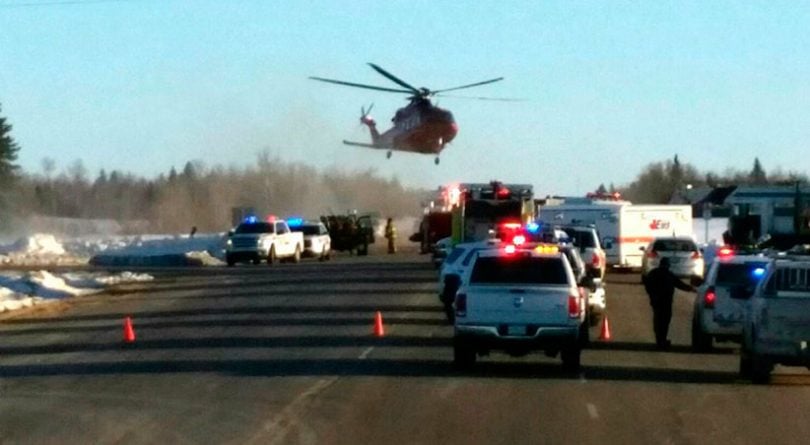
Brost: They were so injured and so hurt, that you couldn’t get past step one. Step one is airway, because there’s no point in giving an IV and pain medication if there’s no airway. There was so much facial trauma and head injuries, we just tried to provide oxygen.
Moffatt: It was at the junction of three municipalities, which means there were three different RCMP, three fire departments, three different first responders and three different ambulance services all at the same time. There was control. People knew what they had to do. They were treating the injured and getting them into the ambulances.
Brost: People were running around frantically from person to person, climbing under the bus or over the bus. There were patients everywhere. In extreme multiple casualty incidents like this, there are four different colours: green means they don’t haven’t to go by ambulance; yellow means they have to go to the hospital, but it can wait; red means critical; and black is deceased. Every single patient was black or red.
Moffatt: All the paramedics said they just remembered how silent it was. I don’t know if that’s a psychological effect, but there wasn’t a lot of yelling. There were no sirens. There were people moving around and doing their job. With that many people on scene, you would think you wouldn’t be able to hear what’s going on, but you could hear it.
Brost: Some of my co-workers said they either heard nothing, or that it was so loud. They couldn’t get over how loud everything was. The rest of us heard nothing: eerily quiet and focused, blocking everything out.
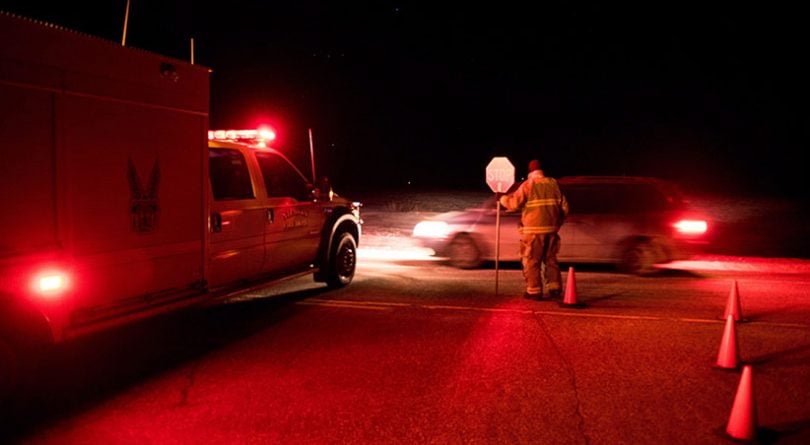
Gomercic: As I was being taken away, I thought I was sleeping at first. So I was, like: ‘When am I going to wake up? When am I going to wake up?’ I thought it was a dream… a nightmare. Every step was: ‘I’m going to wake up now.’ But I just never, ever woke up. I just looked back and I could hear the guys yelling. I knew there was nothing I could do to help them.
Brost: I had to take a survey and run from patient to patient to get a grip on things. There were EMS people, bystanders, conservation officers and firefighters helping the EMS people put patients on a spine board or strapping them onto a board. It’s cold too. Someone also first on scene, I think a house close by, brought blankets. I thought: ‘Who the heck has this many blankets in their house?’ We went out there for a Code 4, with sirens, and they were already covered up. I don’t know how they got there before us. There were 20 blankets. I don’t know where they came from. People don’t carry them in the car like that and they were big comforters.
Doug Johnson, Nipawin Hawks coach: A former teammate of mine, Trevor Demmans, was there early. He was there before the first responders. He was taking his daughters to a rodeo in Tisdale. They had their horse trailer and got to the accident before the first responders. He was handing out blankets.
Brost: Later I realized how significant that was, preventing hypothermia with some of the patients by covering them up. They covered up the deceased under these blankets, which when you come to that type of situation, it’s helpful to focus on the living patients when you can get distracted and overwhelmed by the tragedy in front of you. I went around to double check that they were, in fact, deceased and no one had made a mistake and the person was just unconscious.
Myles Shumlanski: Nobody wants to be a hero. They were just doing what comes natural.
Brost: I’m checking pulses. I’m looking at pupils to see if they’re dilated. Quite often they’re fully dilated which indicated a head injury. I went from person to person, check pulse, check pupil, cover them back up and onto the next one. Definitely not breathing. Definitely deceased. I don’t want to go into graphic detail. A lot of them were pretty obviously deceased. I just lifted the blanket a bit and it was certain.
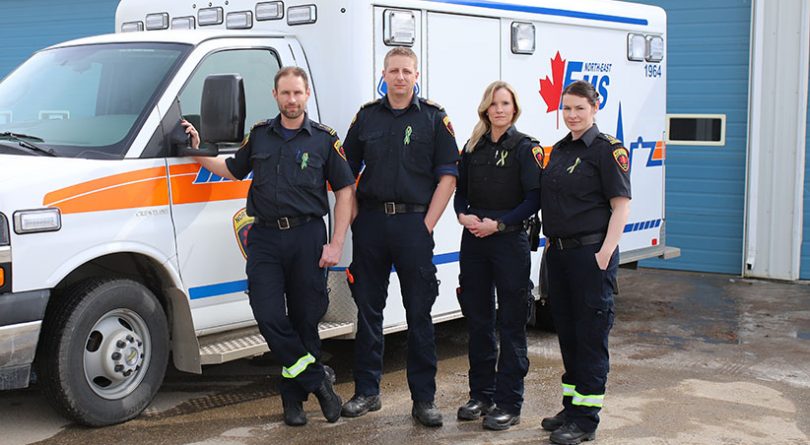
Johnson: Trevor Demmans phoned me when he got back in the vehicle: ‘Humboldt’s bus was in an accident.’ Then he started talking about the scene. He said there were kids no longer with us. After getting off the call, I phoned Bill Chow; he’s the SJHL president. Then it was just fielding calls. We didn’t wait for confirmation from the league; we told the people here the game’s cancelled. We told our radio announcer the game is canceled. Then I brought the guys in to talk to them.
Doerksen: Guys are taping their sticks. Others are playing soccer in the corner. Then Doug got the news and brought us all in at about 5:30. The whole evening’s a blur, but he said something along the lines of: ‘Humboldt’s been in a terrible accident. The game’s been cancelled.’ We still didn’t know any details. Nobody knew any details. Guys are best friends with some of those guys. I called my parents first. Then I called my billets, because my billet dad was truck driving that day on the same road. Her first reaction was: ‘I hope it’s not Dave.’ But then she got a hold of Dave.
Johnson: We knew it was bad. We heard there were casualties. The bond between hockey players, it’s such a small community. Kenzie Arnold [of the Hawks] dates [Bronco] Bryce Fiske’s sister. You could see his face fall. For the first bit, everyone was on their phones: Nick Shumlanski is okay. Bryce is at the hospital. When information started coming in, it helped. But then the bad information started coming in.
Darren Opp, Nipawin Hawks president: Our entire hockey team was sitting in T-shirts, pre-game warm-up stuff, just sitting in the dressing room in silence; coaching staff in silence. It’s a heartbreaking thing to see. Everybody’s upset, just sitting, waiting to hear something—anything. Everybody was still hoping that the initial news was not going to be true. Somebody had to be making a mistake or something.
Doerksen: I brought everyone into the dressing room—I’m religious—and told everyone: ‘I’d like to pray for these guys.’ What else can you do? They had the option if they wanted to come, and everyone came. We just sat and prayed. Guys were crying. There was nothing else we could do.
Rene Cannon, billet mom to Labelle, Hunter and Herold: It was about 5:30 p.m. I could feel and hear my phone ringing in my purse. It was Xavier’s mom Tanya and she said: ‘I got a call from Isaac [Xavier’s brother] and he thinks there’s been an accident with the bus. Have you heard anything?’ And I said: No, have you tried to call Xavier.’ She said: ‘I did but said he isn’t answering.’ I said: ‘Okay Tanya, don’t panic. I will try to call Logan and Adam and I have numbers for one or two other players that are here often enough that I like to give them some teasing once in a while.’ So my daughter watched me and I really, really believed in my mind that the bus had hit the ditch, that I needed to just get in touch and get some reassurance, I guess partly because what actually happened isn’t in any way something that anyone could have imagined.
Muench, Humboldt’s mayor: I picked up a bottle of wine for supper and we’re getting ready to listen to the game. We have a radio in the kitchen. My wife flipped her phone on and it said on Facebook that the game is cancelled. I said: ‘Cancelled?’ She said: ‘There’s an issue with the bus. More information to come.’ And then social media blew up.
Russell Herold: We were going to watch the game on TV. We were having an early supper and my friend that lives in Nipawin called me at 5:45 p.m. He asked if I’ve talked to Adam. I said: ‘Why?’ He said: ‘There’s been an accident with the bus. You should try and get a hold of him.’ He knew how serious the accident was, but he didn’t know about Adam and didn’t want to let on.
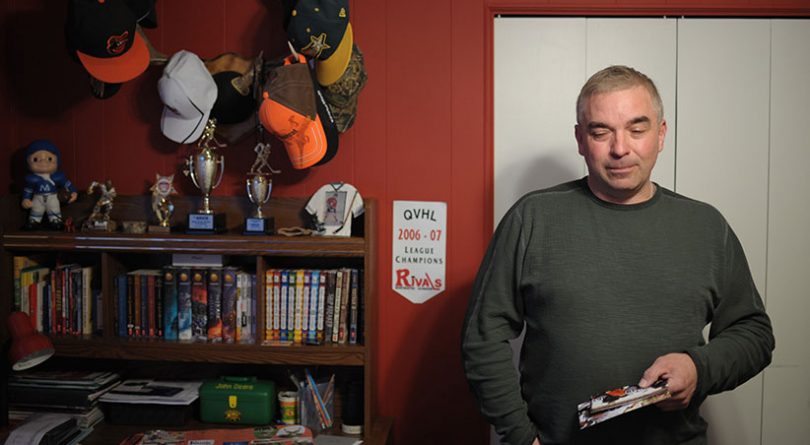
Cannon: So I attempted calling Xavier’s phone. I attempted Adam’s. I attempted Logan’s and I didn’t get any answer, which was understandable, I guess, because I assumed they were busy trying to figure out what to do or what had happened. My dad lives in Nipawin so I called him because I assumed the boys had been much closer to Nipawin than Humboldt.
Garinger: I was in Edmonton for a family emergency. I got a phone call from one of my board members [Keen] who said: ‘Kevin, have you heard anything about a potential bus accident?’ I said I haven’t heard a thing. I started calling members of my board and other folks and tried calling Conner and others. Not getting any answer. I started checking the time. ‘Well, it’s close to 5:30 and they might be out to have a pre-game meal.’ Those kinds of things go through your head. But there’s always that piece that said you’d better make sure you know exactly what’s going on.
Keen, Humboldt billet co-ordinator: Around suppertime, I was at a friend’s house. I got a phone call from one of my billets and she had heard there was an accident that involved the boys. I tried to call Darcy and there was no answer. So I texted him, and then I phoned Kevin [Garinger], and let him know what I was told and that I couldn’t get a hold of Darcy. I was thinking Darcy’s probably getting ready for the game, and he doesn’t answer his phone when they’re getting ready for a game on the bus. So a lot of it was denial. At the same time your heart drops because you’re worried they didn’t answer. Two different things at the same time; it’s kind of hard to describe.
Herold: I tried calling and texting Adam and it’s not unusual not to hear from him. Before game time, he often puts his phone on silent. So I wasn’t too alarmed yet.
Muench: The Mayor of Nipawin phoned me. She asked: ‘Have you heard?’ I said: ‘Yeah, but I don’t really know what’s happened.’ She said: ‘It’s bad. It’s bad. There’s been a number of casualties. It looks like seven.’ I said: ‘My god.’
Cannon: So I asked my dad to start calling people to find out if the bus had been in an accident. I called Christina Haugan because we keep in touch and are friends and I didn’t get an answer from her, but she called me right back. I said: ‘Christina, I’ve heard there’s an accident.’ She was crying and she said that a truck had hit the bus as she started hyperventilating because she said she didn’t have enough information.
Garinger: I ended up calling the Nipawin Hawks organization, getting to the president of the organization, Darren Opp, who’s an absolute rock for us as an organization. Him and his team, everyone associated with the Hawks, were just incredible, and Darren let me know there had been an accident and that it was bad—real bad. A semi tractor had hit our bus. We didn’t know a whole bunch more.
Cannon: I called Xavier’s brother Isaac because Tanya had said he was the one that had called her and he said: ‘What’s going on? What do you know?’ I said: ‘I don’t know anything yet.’ He said: ‘A truck hit the bus.’ I said: ‘Where are you? You’re not driving are you?’ He said: ‘No, I’m at home.’ I said: ‘We are three minutes from your house. I am coming.’ I walked into the house. I was the first one to be with him.
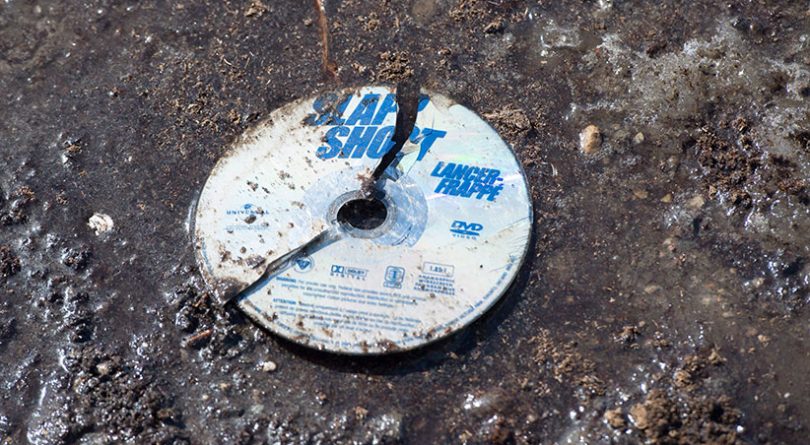
Herold: I called back my friend [in Nipawin] and asked: ‘How serious is this accident?’ He said: ‘It’s serious. You’d better come here.’ Erin [Adam’s older sister] was coming home from Regina to have supper with us Friday night. She rushed home and we went up together. We drove up to Tisdale, 3-plus hours, in panic mode. You’re calling RCMP and RCMP says they’ll call you back when they know something. We phoned the hospital and they don’t know anything. Chris Beaudry, the coach that survived, he witnessed the crash and was on the scene. His was one of the numbers I tried and he answered. I said: ‘Chris, has there been an accident?’ He said: ‘Yes, but they won’t let me close to the scene.’ You’re in a panic, so 10 minutes later I phoned him again. We did this four or five times. Then he said there had been fatalities, but didn’t know who. He stayed calm, but it must have been terrible to witness that.
Moffatt: The roof of the bus was completely removed, laying on its side, still kind of attached. The bus was facing south, and I knew the bus was heading north. The first 30 feet of the bus was removed. I still don’t know where it was. It looked like the impact was initially at the front of the bus.
Johnson: Everybody knows how the bus is set up. The older guys are at the back. The coaches and rookies sit at the front.
Brost: There were people walking around in t-shirts, and it was cold. I would say it was about minus-15. Some of my staff, their hands would barely work because they were frozen. You had gloves, but they got wet or had blood on them. Your hands were so cold.
Moffatt: As soon as we got two patients in one ambulance, that ambulance would head out and the next ambulance would get ready for two patients. When we looked at the times of ambulances on scene, it was roughly 15 minutes per ambulance, which is unheard of. We knew the severity of it. Trauma alert was called at our hospital. Our hospital took all the serious patients and they were transported there.
John Griffiths, responder at STARS Emergency Link Centre: The call arrived probably just after a quarter past 5 with STARS. They wouldn’t have known there was a big bus crash. They wouldn’t have known anything happening. They just would’ve had the location. I wasn’t on shift. I started my shift at 19 hundred and we usually show up a little bit early so I was there at about 6:45pm. I took over the helicopter that had landed at scene. I landed there and made sure everybody was already on their way up to the hospitals. The patients, the most critical ones, had actually been evacuated by ground ambulance and sent to two hospitals, Nipawin and Tisdale, so the helicopter actually left the scene without any patients on board and flew up to Nipawin, where they landed and then the medical crew and the transport physician started treating the patients.
Rob Gomercic, Matthieu’s father, who received a call at his Winnipeg home from another parent, saying Matthieu had been taken to hospital: I said: ‘Can you provide me with anymore information than that?’ He said: ‘No, it seems really bad. There’s going to be good news and bad news.’ We were hoping he didn’t take a turn for the worse. It was pretty nerve-wracking.
Griffiths: With so much trauma, the local hospital is going to lose its blood supply. For a lot of patients, you might run out. We’re based in Calgary. So Alberta was able to pack units of blood from two hospitals in Alberta, put them on planes and then send a bunch over to Nipawin to help out. I don’t think I’ve ever heard of blood from one province going to another province. It just wasn’t even a question. It was ‘send whatever you need, Alberta’s happy to help.’
Mike Schlosser, close friend of Elgar Petersen: We were in Saskatoon with our son having supper. I got a text that the bus had been in an accident. We went out to the vehicle and I called Elgar to let him know there’d be no game tonight, that the bus was in an accident. Right away, he asked if anyone was killed and I said: ‘I don’t know. It doesn’t sound good. It sounds serious, but I’ll keep you updated.’ I think he called four times between 6:30 p.m. and 10:30 p.m.
Shauna Nordstrom, mother of right winger Logan Hunter: We were waiting to try and get some news of what had happened in this accident and a couple of his dear friends came over and they wanted to be with me and we kept praying in a huge circle that he was going to be okay, that he was going to be in one of those small hospitals or had been airlifted to Saskatoon because we knew the STARS ambulance had been on the site. We just hung on to each other, we prayed as hard as we could, and the clock kept ticking and no news was coming our way so a group of my friends drove with me to Saskatchewan and Logan’s older sisters came along with their step brother. We had to get to the Royal University Hospital [in Saskatoon] as fast as we could.
Scott Thomas, father of centre Evan Thomas: I was riding up with the starting goalie’s parents from the other team in the same vehicle. You see one ambulance come flying over your left shoulder, you see a second, you see a third and you see the STARS air ambulance flying overhead. You have this really ominous feeling and you realize this is going to be bad.
Jack Redlick, head coach of the St. Albert Raiders, where some of the Broncos, including Logan Hunter, used to play: I got a hold of Logan’s mother just to see how she was doing. They were driving to Saskatoon already. They hadn’t heard anything yet, they just had to get there. I couldn’t imagine that drive—six hours from Edmonton to Saskatoon. They didn’t know if their son was alive or dead or what. They had nothing.
Thomas: We pulled up to the accident from the west. You can see bubbles—red, blue flashing lights—all over the place. And police cars and firetrucks across the highway basically stopping anybody from going any further. You can see the top of the bus, you can see the carnage, twisted metal, that one piece of the bus sticking straight up. There was a dead, eerie silence with all the people that were around there. That feeling of nervous anticipation and dread when you know something bad is coming.
Paul Labelle, a Saskatoon emergency room doctor and father of Xavier Labelle: I went to the scene, but they turned me away.
Thomas: You play those scenes over in your mind and you see them in the movies—guys trying to fight through the police officer to get there. I never had that feeling. It was a feeling of resignation. I started pacing back and forth, it was cold, so I walked back to the car to keep moving and keep my mind occupied. It was a feeling of resignation, like: ‘Oh my God. Now what?’
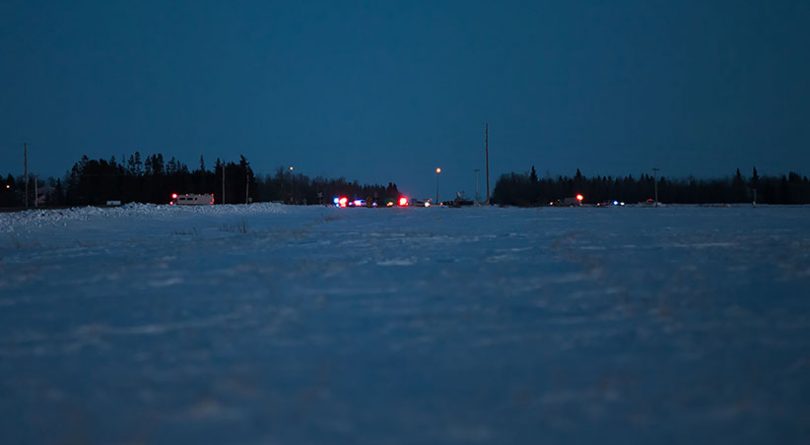
Russell Herold: Adam’s coach [with the midget triple-A Regina Pat Canadians, Darren Mckechnie, phoned us and asked if we knew anything. He’s a Regina police officer. I said: ‘No Darren. We’re in a panic here. If you could find anything out.’ He texted us a number for a crisis line. We phoned that and we were told he was in Nipawin hospital. We thought: ‘Okay, we’re happy he’s alive.’ But the Nipawin hospital had no record of him. We called the crisis line again and they said: ‘No, he’s there. He’s on the list.’ She told us to hang on a minute, came back on the line and asked where we were. We were an hour out of Tisdale. She said: ‘Go to Tisdale hospital.’
Kelly Schatz, Logan’s father: They got us into a waiting room area. I heard five of the boys were at the Tisdale hospital, but they wouldn’t really say who it was. They were having trouble identifying these boys. They had no wallets with them. They were going to a game, so they didn’t need it. They all had their hair dyed blond for the playoffs. I know Dayna Brons was one of them, the trainer. I know she was there and they were sending the STARS helicopter to pick her up, taking I would assume the worst to Saskatoon as quick as they could.
Griffiths: When the hospital is calling saying we have five people and they’ve got X, X, X and X wrong with them, it’s not a big panic on the other end. They just say: ‘Do this to this one, he’s the most important one, and do this to this one.’
Ryan Straschnitzki: I lost my cell phone, and I stopped at Nipawin’s hospital. They gave me a phone and I called my parents on that.
Rob Gomercic: When I saw [Matthieu] he was smiling, so I knew he was okay. I was very happy I got a chance to hug him. I can’t even explain in words how I was feeling. A sense of relief. Just to see his smiling face.
Garinger: I was concerned about Conner. I was concerned about these others that had been in my home. And I had relationships with these kids and they were incredible young men, and it was extremely hard and something that went from extremely terrible to unimaginable. We started hearing names.
Myles Shumlanski: In the hospital you’d hear that this one passed away. You’d talk to a couple parents. ‘We haven’t found where our boy is.’ If you didn’t know which hospital your boy was at and it was three hours later, you knew it was a problem.
Russell Herold: When we got [to Tisdale Hospital] we were put in a room with other parents and billet parents, waiting for news. We couldn’t go to the site. The highway was barricaded off. I thought something was up. I could see someone motioning to the pastor and they were waiting for the RCMP to come.
Kelly Schatz: We found out several were transported to Nipawin, some went to Tisdale, and some went directly to Saskatoon, but we had no names. We just had to wait until we figured out who was where. And so we waited until somebody came to actually talk to us. The RCMP came to us and said we need to talk to you, so they took us to another room and told us what happened.
Shauna Nordstrom: Unfortunately when we arrived we were given the terrible news that Logan had been one of the deceased men in that bus.
Redlick: We ended up having five ex-Raiders alumni that were killed in that crash: Stephen Wack, Jaxon Joseph, Logan Hunter, Conner Lukan, and the head coach Darcy Haugan played for us back in 91-92.
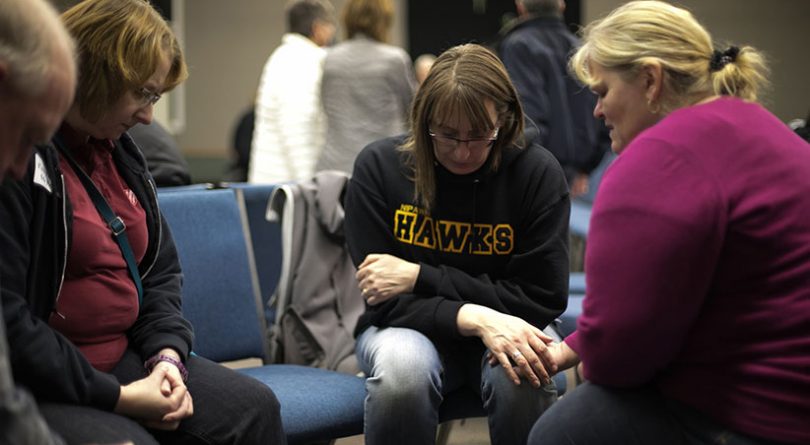
Doerksen: A lot of the guys went to the church. That’s where the families of Humboldt players gathered for information. I stayed back at the rink. I felt lost. I remember sitting at the rink. We were getting details later that night. Guys heard stuff, but nothing was confirmed. Later on, probably around 11 p.m., the RCMP came in and gave us a few confirmations so we started finding out details. They confirmed there had been fatalities and there were many in critical condition. I just sat there. I wanted to wake up from a nightmare. That’s what it felt like. I sat there from 5 p.m. until 12.
Herold: We got the news around midnight, though I lost track of time. I said: ‘I want to see him.’ They said: ‘He’s in the wreckage and you can’t go there.’ We went to the local hotel where they gave us a room and we just waited. But they didn’t know where he’d be taken, if he’d be Saskatoon, or when. So we’re waiting in limbo and a police officer came into the hotel to get us a room. I asked him if there’s any way he can get us any information. If he’s going to Saskatoon, we’ll start going there. He said: ‘I’ll find that out for you.’
Cannon: We waited so long because all three of the boys were unaccounted for. Raelene and Russell got to Tisdale. I asked them to please let me know and then my phone rang. It said ‘ID unknown’ and I almost didn’t answer it but I did. It was the RCMP. The RCMP officer said that he was calling on behalf of Russell and Raelene Herold and he was so very sorry to tell me that Adam had died in the crash. He was one of the first kids to be identified because he was actually carrying his ID. So they knew with absolute certainty it was him. I wept while Xavier’s family held me.
Brost: When we left, there were eight or nine accounted for as deceased. I remember them lined up with blankets on top and wearing their dress shoes.
Griffiths: The Saskatchewan health authority basically ended our involvement once the last patient was back in Saskatoon and transported. So they left Nipawin, it must’ve been about one in the morning. The last patient landed safely back in Saskatoon and drove them over to the hospital there at about 2:15 a.m. We do emergency transport and make sure patients get back to the major care centre, in this case it was Saskatoon Royal University Hospital.
Muench: It was like a snowball rolling down the hill. The first night I went to bed, there was media here from Saskatchewan. I went to bed and I got a phone call at 4:30 a.m. It was the BBC. It travelled that fast.
Herold: About 4:30 a.m., the coroner and another RCMP officer knocked on the door. They confirmed [Adam’s] identity. His wallet was on him. They said: ‘You may as well go home. He won’t be released today or tomorrow. It could be as late as Monday.’ So my sister-in-law and her husband had raced up there to be with us. They drove their vehicle and our vehicle as we started back to Regina to tell my mom, who’s going to be 92 on April 28th, the bad news. We stopped and told her, got home here on the farm and walked in the door when our billet mom, Renee from Humboldt, got a hold of us and said they’re having a viewing at 1 o’clock in Saskatoon. There had been a change of plans. A viewing of all the bodies to try and identify them. We turned around and drove three hours back to Saskatoon. This was Saturday. You raced up there to get to the accident. Then you drive four hours back, then three hours drive back again. I don’t mind the driving if my son was there.
Stork: Seeing Darcy’s name and face on TSN, that was painful. I knew he was dead, but it just became real.
Bernadine Boulet, Logan Boulet’s mother: When they told us what Logan’s condition was at that time, we just knew that something good could come and that someone’s life could go on when our son’s couldn’t. We knew he was in really good shape, we knew that his organs would be in good shape, and we knew that someone could benefit from that. I got to listen to Logan’s heart, and now someone else has his awesome heart in their body. It was beating really strong, so I’m so happy for someone.
Herold: We saw Adam in the Saskatoon funeral home. It was sad. You’re in disbelief. Now you hear about the poor kid that was misidentified [Xavier Labelle], that was Adam’s billet brother. In hindsight, I remember seeing Adam and thinking: ‘He’s got the wrong colour hair. It’s not Adam.’ Because their hair was all dyed blond. As soon as I got up closer, yes, it was definitely him. It was blood in his hair.
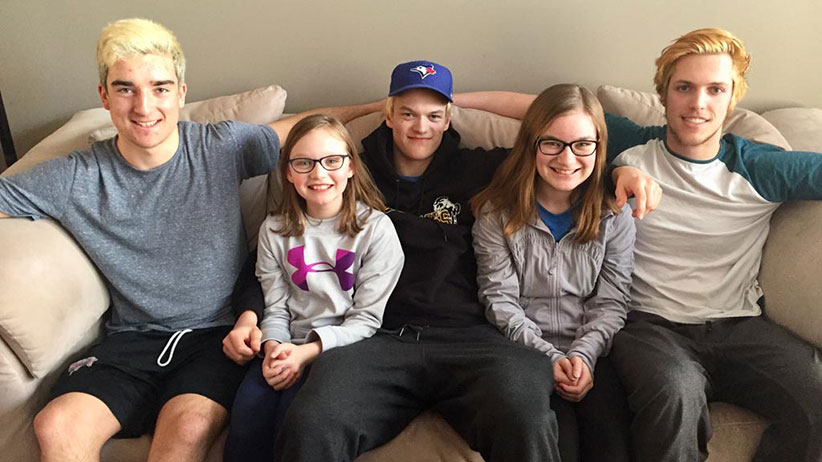
CHAPTER 5: ‘IT’S AN HONOUR TO WEAR THAT JERSEY’
Mike Schlosser, close friend of Elgar Petersen: My wife and I drove to the nursing home Saturday morning to explain to Elgar what happened, and that there had been some deaths. Then we got him to listen to the radio station because the newstalk had everything on about the accident. He put his headset on and listened. I had my phone on, so I could hear exactly what he was hearing. Then we went down for food and we went with him. It was on TV and they had a little shrine set up where the Bronco team had been a couple months back when they went to visit Elgar and the rest of the nursing home residents. They had taken a bunch of pictures, so they had that all set out. Elgar spent a lot of time there sitting there, looking at the pictures.
Clark Stork, former play-by-play announcer: I rode that bus for five seasons, 265 games, and this year I wasn’t doing the job anymore. I just –I’m baffled as to how this could even possibly happen. I had to tell my seven-year-old son that his hero, Logan Schatz, the captain of our team, is dead. He’s been a Bronco since he was 16. It’s not right.
Muench, the Humboldt mayor: The Prime Minister called me Saturday morning. He offered his condolences and shared a story about his brother passing away young and how that affected his parents, and what these parents must be going though. And then he shared the story about his son, who’s starting to travel with hockey, and how that impacted him.
Stefan Freter, Bronco from 2013-14: I live in Saskatoon now. I’ve kept my Broncos hockey jersey ever since I got traded. I kept it tucked away in a box. As soon as I heard, I brought out all my equipment and hung it in the windows so everyone could see it from the road.
Muench: Pretty much every clergy person presented the idea of having a vigil. They suggested Tuesday, but I thought we should have it sooner. I said: “Maybe we should have it Sunday. The game was supposed to be on Sunday.”
Matthieu Gomercic, Broncos left winger: I think all of us that are here right now are amazed that anybody could come away from that. The bus—there was almost nothing left. We’re beyond thankful that we were able to somehow come out of it. It’s just crazy that where you sat basically chose what happened to you, right?
Nick Shumlanski, Broncos centre: We’ll just take it day-by-day, for now. I mean, I’m not too worried about the future [of playing hockey] right now.”
Gomercic: I really miss everybody. I’ve sent a lot of these guys texts hoping that maybe, somehow, I’d get an answer. It’s holding on to this sense of belief that maybe they’re out there somewhere. You know, like this is just a dream where somebody’s just ended up sneaking off somehow, and now he’s just been found.
Myles Shumlanski, Nick’s father: I think anybody at my age would gladly give my body for any one of those boys, because they, they did not deserve this.
Stefan Freter, former Bronco: A bunch of the alumni created a Facebook group about the vigil and we all said we’d go. For sure, we’d be wearing our jersey. It brought a lot of emotion to us alumni that night. It made it more real to think that could have been any of us, any year, any team across Canada.
Russell Herold, father of Adam Herold: We planned to go the vigil in Humboldt, but we found out late in the day they were doing a vigil locally, in Montmartre. We did feel obligated to go to Humboldt, but this was where Adam started. I thought it would just be outside the local rink and a few people. It was inside the rink and there were maybe 600 people. He was a little Montmartre Ice Dog to start. They had net a centre ice and his #10 Ice Dog jersey hanging there.
Stork: It’s so heartbreaking now, you go by the Elgar Petersen Arena, all those boys’ cars are still there. Plates from Alberta, Manitoba, Saskatchewan, far and wide. There’s flowers on them now and stuff, but like, that’s where they parked. They got on the bus, thinking obviously they’d be back at one o’clock in the morning to drive back to their billets.
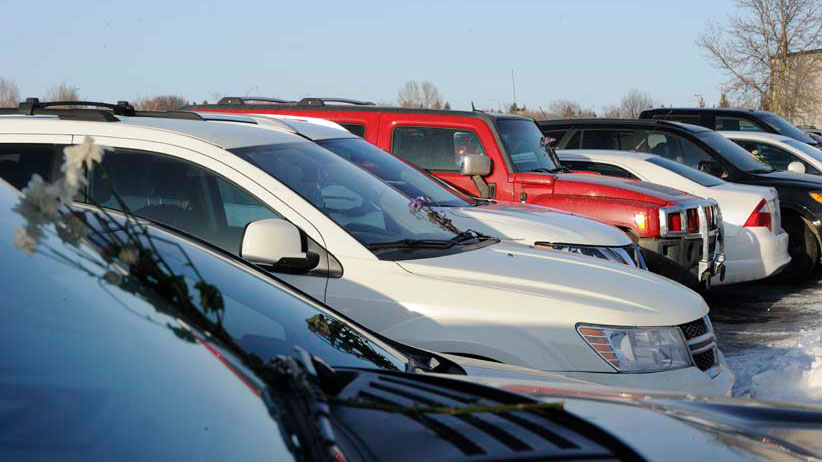
Jack Redlick, head coach of the St. Albert Raiders: [Logan Hunter’s] mother got a hold of me on Sunday, and just asked if I could get a hold of the league and make sure Logan’s scholarship didn’t go to waste, that they could give it to another player in Logan’s name.
Freter: All of us alumni went to the church before the vigil and met with our chaplain, Sean [Brandow]. We were giving hugs and catching up. Not many people know of Elgar Petersen.
Muench: From Day One in the 1970s, he was a trainer.
Garinger: We’ve got parents coming in here over the course of the day to clean out lockers and just to be in the place their kids love the most: Elgar Petersen Arena.
Freter: This is one of the communities where the rink isn’t named after someone who donated the money for it. Elgar has been a part of the organization forever and that’s why it’s named after him. One of the most emotional things was seeing him roll in [to the church]. I was speaking with [former coach Dean] Brockman when Elgar came in on his wheelchair. The whole church went quiet. We all went and gave him a hug.
Muench: The vigil was planned in less than 24 hours. It was the biggest event that’s ever happened in our city. I was trying to figure out numbers, maybe 6,000 people, which is the population of our whole city. But it wasn’t just people from Humboldt. They came in from far and wide.
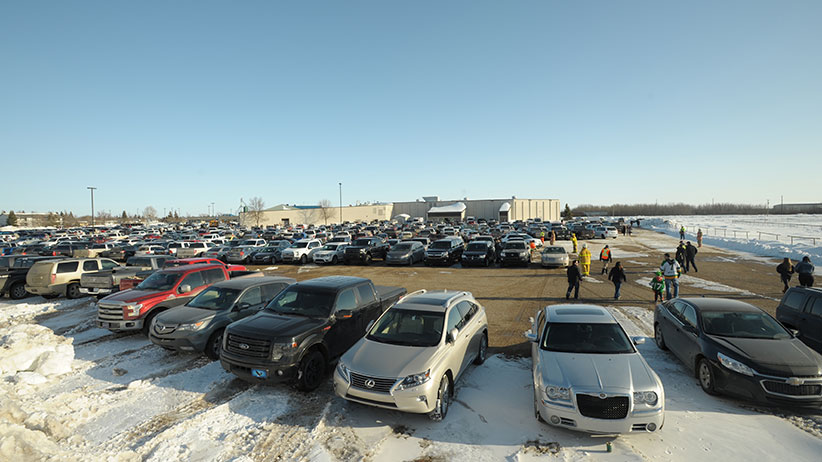
Freter: Walking onto the ice and not seeing an empty seat was amazing. We heard the curling rink was full. The school was full. The church was full. Another school was full. Humboldt is one of the biggest hockey towns in Saskatchewan. I never doubted for a second they would get this support. It shows how much this team meant to that town. It was a humbling thing to see.
Ryan Straschnitzki, Broncos defenceman: I want to show them how tough we are and how solid a team we were—if I cry maybe it shows a sign of weakness. I want to show we’re still in this together. I’ve always been told to be a strong Canadian kid and things are going to get better if you just push through it and work hard. Pain doesn’t last forever.
Tom Straschnitzki, Ryan’s dad: He keeps wanting to try and move his legs, of course, because he wants to go back skating. He just looked at me and his mother and he goes: ‘Well, I’m gonna get onto the Olympic sledge hockey team.’ He’s an amazing kid, that boy.
Gomercic: Even just driving to the rink I could see the overflow (of crowds) in the church and the high school, outside of the rink, which was full. It was unbelievable. It was really something special.”
Shauna Nordstrom, mother of right winger Logan Hunter: I think I’m still in shock, still numb. I’m just thinking he’s in Humboldt playing hockey and I’m driving to watch him play. Has it sunk in? No. It sure hasn’t sunk in.
Phyllis Wasserman, great-aunt of injured goaltender Jacob Wasserman: We’re just keeping our fingers crossed and praying. I keep saying to my husband, ‘I could see him standing in net still and putting his helmet on, shaking his head, and then this.’ It’s a shock, the whole thing.
Freter: Friends and family all gathered on one side underneath the stands. It was quiet. We happened to be by some of the family of the current players who didn’t make it.. They were being handed their son’s jerseys. We saw these parents grab these jerseys and just hug them as they cried. It hit home for everyone. There wasn’t a dry eye in that arena.
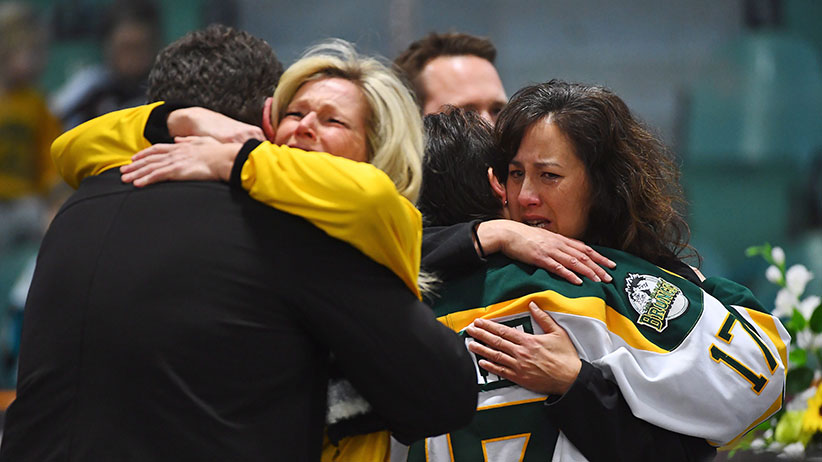
Muench: At 7:30, there was a moment of silence. That’s when the game would have started.
Pastor Sean Brandow, Broncos chaplain, speaking at the vigil: I’ve heard so many times: ‘I wonder if this community will ever be the same?’ You know how Jesus showed that he was who he said he was? His scars. A scar is something that is healed but still there. This isn’t going to go away. It’s not going to be as raw. Can we heal? Yes. Will the scar be there? Yes.
Drew Wilby, Saskatchewan Ministry of Justice: We were made aware that an unfortunate error had occurred in the identities of two of the individuals involved in the tragic Humboldt Broncos collision. Xavier Labelle, who had previously been confirmed as deceased, he is alive. Unfortunately, Parker Tobin has been confirmed as deceased.
Ron MacLean, Hockey Night in Canada: Don and I were visiting with what we thought was Parker Tobin’s family. So you know the story now. Parker Tobin, the goaltender from Stony Plain, Alberta, we thought had survived. In fact it was Xavier Labelle. So imagine, the mom and dad and the brother, they don’t know that they’re not looking at their own boy, that he’s so severely cut and hurt that they actually think it’s possibly their boy. And I can remember her, this is Parker, the mom, saying, ‘He’s beginning to look more like our boy.’ Can you imagine? And it wasn’t, of course, their boy.
Cannon, billet mom of Labelle, Hunter and Herold: Xavier’s parents were gone for hours, hours. There’s so few details that I know. They had obviously accepted that the person they were being told was Xavier was Xavier and we grieved with them and we went to the Sunday night vigil in Humboldt to be with all of the other families and support the community and stuff, believing that we had lost our three sons.
Freter: After the vigil, people didn’t know what to do. They didn’t want to leave. There were people sitting in the stands staring at the ice. There was us left on the ice making conversation with billets or those we haven’t seen since leaving Humboldt. We went by their pictures and read some more cards. The whole place was in awe. It was like a place of worship. We went to look at all the flowers and cards left on centre ice. We read a few of them. Someone came up the idea of the alumni, with all our jerseys, circling centre ice for a picture. When we were around centre ice, we put our arms around each other.
Muench: The players congregating at centre ice after vigil I didn’t notice at first. I was talking to people and then all of a sudden, you could see what was going on in the corner of your eye. I ran over to the barricade and started taking pictures.
Freter: I’m not sure who it was, but someone started applauding us. Then everyone in the rink did. It was one of those moments that sent chills down your back. It’s an honour to wear that jersey.
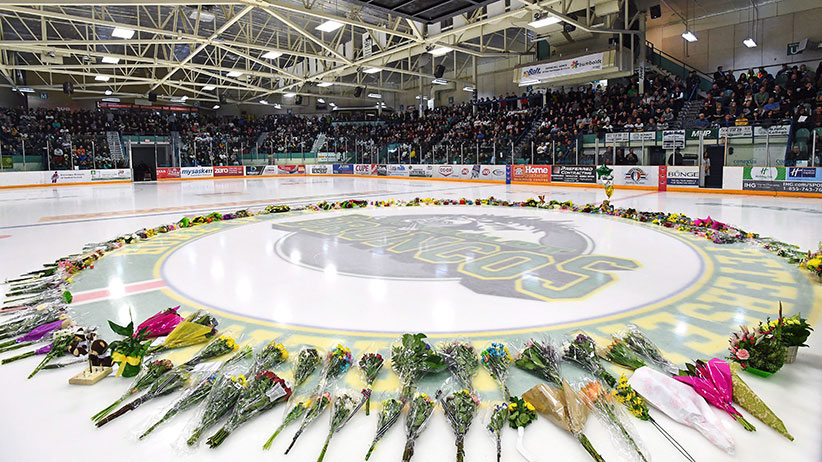
Interviews and editing by Aaron Hutchins, Jason Markusoff, Kyle Edwards, Meagan Campbell and Michael Friscolanti
This oral history relies on interviews conducted by Maclean’s and other media: Ryan Straschnitzki: Sportsnet, Kiss 92.5; Tom Straschnitzki: Calgary Herald; Shauna Nordstrom: St. Albert Gazette; Nick and Myles Shumlanski: CTV News, Postmedia News; Marilyn Hay: Saskatoon StarPhoenix: Matthieu Gomercic: Winnipeg Free Press; Rob Gomercic: Winnipeg Free Press; Paul Labelle: Postmedia News; Bernadine Boulet: Global News; Phyllis Wasserman: Regina Leader-Post; Colin Brochu: Globe and Mail; Ron MacLean: 680 News.